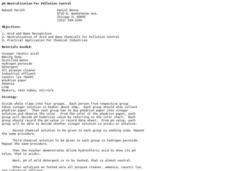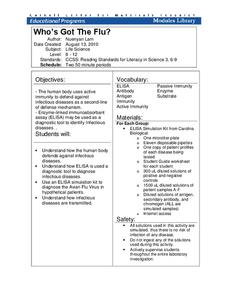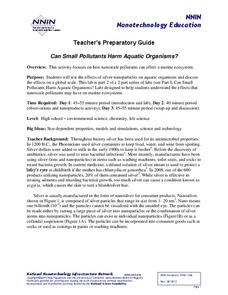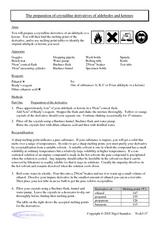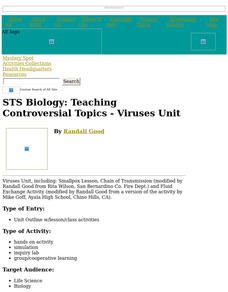Curated OER
Sensational Slime
Students mix solutions of polyvinyl alcohol and borax. They predict what happen and record their observations. They prepare a T-chart comparing Jell-o to their mixture.
Curated OER
Acid-base Homework Problem Set 1
In this acid-base reaction worksheet, students balance reaction equations when acids and bases are mixed then calculate the pH of the solution. There are 2 questions with a total of 18 parts.
Curated OER
Global Change: Where Land, Air and Water Meet
Students discuss the atmosphere as a mixture of gases. In this science lesson plan, students explore the world's oceans and fresh waters understanding that there are dissolved chemicals. Students realize that many substances dispersed in...
Curated OER
Acid-base Homework Problem Set 2
In this acid-base reaction instructional activity, students calculate the ion concentration and pH for 6 solutions, graph titration results for 11 reactions and use Henderson-Hasselbach equations for three problems.
Curated OER
Colorful Milk of Magnesia
Students explore acids, bases, and indicators. They observe the various colors of an acid-base indicator solution and the neutralization of an acidic solution by an antacid.
Curated OER
PH Neutralization For Pollution Control
Learners recognize whether a solution is an acid or a base. In this acids and bases lesson plan, students use chemicals and identify if those chemicals are acids or bases. From the conclusion, learners will be able to identify if the...
Curated OER
Starch is Everywhere
In this science activity, learners add a few drops of iodine solution to each of 10 substances to determine if they contain starch. The iodine will turn blue if the item contains starch.
Curated OER
Harmful Effects of Acid Rain
Students participate in an experiment to become aware of the harmful effects of an acidic solution -- acid rain.
Curated OER
Is It Safe To Go In?
Students examine acceptable levels of toxins in swimming areas. Working in groups of four, students dilute a salt or sugar solution to 1 part per 1,000,000 (ppm) solution. Students taste test their diluted liquids and record at which...
Curated OER
The Floating Golf Ball
Fourth graders discuss density. For this floating golf ball lesson students complete a lab activity on density while working in groups.
Cornell University
Who’s Got The Flu?
Become an immunologist for the day. Scholars elicit the use of the enzyme-linked immunoabsorbent assay (ELISA) to diagnose an infectious disease. Through the process, they learn about the immune system response to infectious diseases.
Nuffield Foundation
Microscale Investigations of Catalase Activity in Plant Extracts
Use indirect measurements to monitor metabolic activity in plant cells. Scholars understand that cells with a higher metabolic rate have a higher concentration of catalase enzyme. They use this information to compare metabolic rates of...
National Nanotechnology Infrastructure Network
Can Small Pollutants Harm Aquatic Organisms?
Nanoparticles have toxic effects on plant and animal life—even though you can't see them. The second lesson of a two-part series has young scientists conduct an experiment that exposes plant and animals to nanoparticle pollutants. They...
Discovery Education
School of Rock
Why do rocks break down over time? Learners explore this concept by simulating physical and chemical weathering of different types of rocks. They use an abrasive to demonstrate physical weathering and acid to demonstrate chemical...
Curated OER
How Substances Get in and out of Cells
Although it contains some formatting issues, the Word document here contains good questions about osmosis and diffusion, and is easy to edit as needed. Designed as a study guide, you could use the information here for warmups, ideas for...
Curated OER
Pandemics and Epidemics
Students evaluate data related to population growth, along with problems and soultions: disease cvontrol. They are able to explain how changes in habitat may affect organisms. Students evaluate evolutionary theories and processes.
Creative Chemistry
Finding the % of Fe2+ in Fe(NH4)2(SO4)2.xH2O and the value of x
Step-by-step procedures are outlined in the learning exercise and calculations for junior chemists to perform in their science journals. This laboratory exercise is intended for experienced chemistry learners.
Curated OER
Ocean Life
Students explore the topics of ocean water salinity, ocean life zones, marine life classification, and ocean food chains. They observe demonstrations, conduct experiments, complete quizzes and handouts, and analyze key vocabulary.
Creative Chemistry
Preparation of Crystalline Derivatives of Aldehydes and Ketones
Chemistry explorers prepare a crystalline derivative and find its melting point. Once they discover the melting point, they can identify whether the substance is pure or an aldehyde or ketone. This outstanding laboratory activity helps...
California Academy of Science
Coral and Chemistry
Using cabbage juice as a pH indicator, future scientists explore the effect of increasing carbon dioxide on the pH of the ocean and relate it to the health of coral reefs. Ideal for an earth or environmental sciences course, this lesson...
Curated OER
Viruses
A fliud exchange activity using pipettes/droppers to exchange fluids with at least 3 people. your students are advised not to spill any liquid. Droppers are collected in a large beaker, and students return to desks while holding tubes....
Chymist
Tritration: Standardization of a Base and Analysis of Stomach Antacid Tablets
Do antacid tablets really do what they claim? An experimental lesson attempts to answer this question. Individuals practice the process of titration during the first part of the experiment. They then use those skills to neutralize an...
Curated OER
Chapter 14 Review/Acids and Bases
Two pages take chemistry learners on a survey of acids and bases. High schoolers write formulas and name compounds. They identify conjugate bases and acids with the aid of a table (not provided). On the second page, two different acids...
Curated OER
Lab Tests, Results, and Sulfuric Acid
You may want to change the title of this chemistry PowerPoint to "Identifying Compounds in the Laboratory." Individual slides explain tests that can be performed to confirm what element you have: carbon dioxide, carbonates, and metal...







